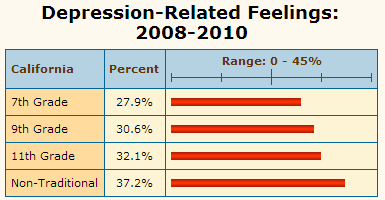What Our Students Are Telling Us About Sadness, Hopelessness
Updated Emotional Health Data Now Available on Kidsdata.org:
Depression is one of the most common emotional health problems affecting youth, yet limited data are available on this issue. One publicly available source of data related to depression is the California Healthy Kids Survey (CHKS), a survey of students developed and administered by WestEd for the California Department of Education (CDE). Kidsdata.org offers CHKS data on student reports of persistent sadness/hopelessness, which may indicate depression, providing a broader picture of the emotional health of California youth.
These data include responses from public school students in grades 7, 9, and 11, and non-traditional students (those in continuation school and community day school). They report on whether in the past year they felt so sad or hopeless almost every day for two weeks or more that they stopped doing some usual activities. Data are available by gender, grade, race/ethnicity, and level of connectedness to school at the school district, county, and statewide levels.
Four Findings Stand Out:
1. Many California preteens and teens feel sad or hopeless for extended periods of time.
Nearly one third (31-32%) of California’s 9th- and 11th-grade public school students reported depression-related feelings in 2008-10. Among younger students, more than one in four (28%) 7th graders reported extended feelings of sadness/hopelessness. The highest percentage was found among non-traditional students: 37% in 2008-10.
2. A higher percentage of girls report depression-related feelings than boys.
California female students in all grades surveyed more often reported depression-related feelings than their male peers in 2008-10, consistent with previous years. The percentage of female students in non-traditional schools who reported these feelings (47%) was far greater than both their male peers at non-traditional schools (29%) and female students in traditional schools (31-37%).
3. More than a third of Native Hawaiian/Pacific Islander and multiethnic students report depression-related feelings. Among racial/ethnic groups statewide, the percentage of 7th, 9th and 11th grade students reporting extended feelings of sadness/hopelessness ranged from 27% to 34% in 2008-10, with the highest percentages among multiethnic and Native Hawaiian/Pacific Islander students, similar to previous years.
4. Students who feel less connected to their schools more often report sadness/hopelessness.
California students who report feeling less connected to their schools (such as not feeling close to people, treated fairly, or safe at school) are nearly twice as likely to report depression-related feelings as those with a high level of connection to their schools (45% vs. 23%, respectively, among 7th, 9th and 11th graders).
See data for your school district or county >>
Why This Issue Matters
Data on depression-related feelings are important because they may indicate a serious health issue. Depression affects the ability of youth to interact and engage in school, at home, and with their peers, which can result in lower grades, increased truancies, and difficulties with relationships. Depressed youth also have higher rates of drug use, aggressiveness, suicidal behavior, and some chronic health conditions. In fact, research has shown that up to 60% of youth who commit suicide had a depressive disorder at the time of their death. Read more >>
Helpful Links
|

In 2008-10, almost 1/3 of California's 9th and 11th graders reported having depression-related feelings in the past year.
|

